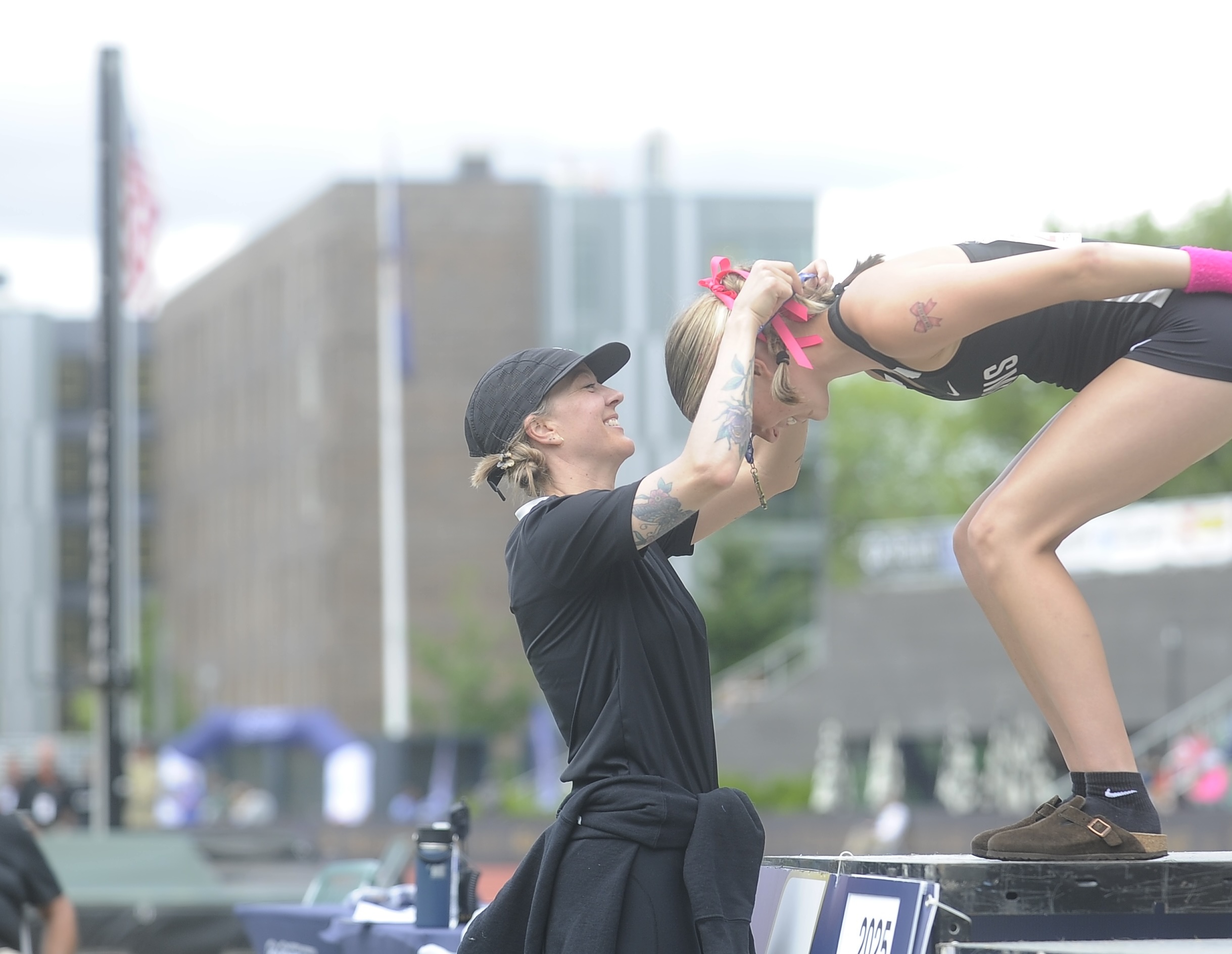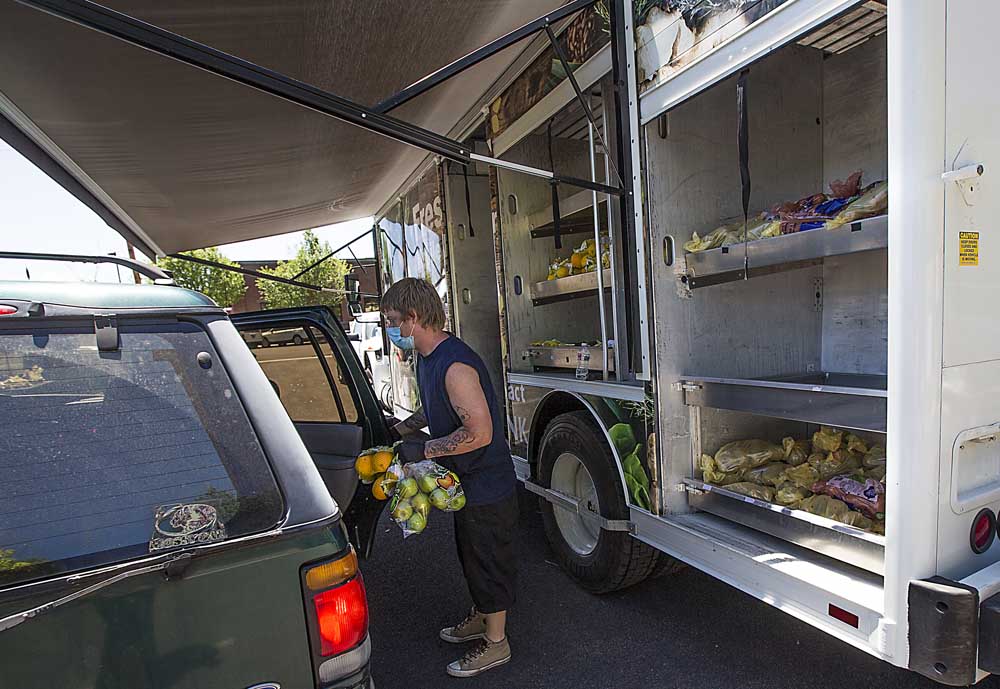Horse named Murphy tries out for Portland police
Published 4:00 am Sunday, February 3, 2013
PORTLAND — In the weeks before he was born, everyone had such high hopes. But as happens in life, nothing turned out as expected. As far as they knew, this horse would always match the name they chose for him.
His father was a big powerful Gypsy, a mysterious European breed not introduced to North America until the 1990s. The stallion, with a beautiful multi-colored coat, was bred with a hard-working Belgian mare.
Even though the colt was three weeks overdue, he was undersized. His coat was black. Although he had white on his nose and on the bottom section of one leg, no one visiting the Roseburg ranch would describe him as a beauty.
So they called him “Murphy’s Law,” a play on the idea that if something can go wrong it will.
In time, they shortened the name to Murphy, but the meaning behind the name stuck with the horse. He was easily distracted. When visitors arrived, he’d peel away from the other horses and trot over, plopping his nostril on someone’s head. He had a younger half-brother — same father, different mother — who turned out to be everything Murphy would never be. Seamus was strong and regal, a three-time Oregon State Gypsy Supreme Champion and twice the regional champion.
“Being honest,” owner Randy Snow said, “we ended up with five horses on the ranch and old Murphy was always low man on the totem pole.”
Then fortunes changed.
Snow had never owned horses, but he decided one day he wanted one as he surveyed the 230-acre spread he and his wife bought for retirement near Roseburg. He was a general contractor building their dream home on the land while his wife returned to Sonoma County in California to wrap up her real estate business.
“I’d ridden one a couple times,” he said, “but with all that acreage it seemed like a horse would be perfect.”
He bought Lucy, a big workhorse, but wasn’t sure how to break the news to his wife, so he waited until she returned to Oregon for a visit on her birthday.
“I figured if the horse was a gift,” he said, “she couldn’t say no.”
His wife was stunned. “My God, he got me a horse,” Jean Snow said. “I tried to be gracious, but I was scared. I’d ridden a horse a couple times, but 35 years ago. But I got used to Lucy.”
Soon they bought a second horse, then found that their earlier purchase of Lucy came with a prepaid contract to breed with a full-blooded Gypsy from California. Lucy gave birth to Murphy. Six months later, Pretzel, the Snows’ second horse, gave birth to Seamus.
Then things fell apart. The California real estate market collapsed, killing both the contracting and real estate businesses. The Snows sold their California home at a loss and moved into a manufactured home on their Oregon ranch.
Unable to afford hay, the Snows let Lucy and Murphy roam the acreage and eat grass, a diet akin to a human eating nothing but pizza. Since they weren’t being ridden, the two horses packed on the pounds.
“We were getting to the point where we had no money,” Randy Snow said. “We had to get rid of another horse. We settled on keeping Lucy. She was our first one. She was the birthday gift.
“What we were left with was Murphy,” he said. “In the horse world, he was nothing special.”
Late last year, they posted a Craigslist ad: Horse for sale, $3,000.
It all made sense. From the day he was born, Murphy was never the star. No one had time to ride him.
And out there on the open land that the Snows had lost, he was a reminder of how in life nothing turns out as expected.
All true.
Also true is that life occasionally offers a second chance.
Hundreds of miles away, Jennifer Mack sat in front of her office computer. For months she had been searching the Internet looking for a horse. In late September, a horse in the Portland Police Bureau’s mounted patrol unit became sick and had to be put down.
The unit, started in the 1900s, fell victim to the Great Depression and was resurrected in 1979. In all those years, only three horses had ever died on duty. As the unit’s equestrian and training instructor, Mack had to find a horse to replace the beautiful and majestic Ian, considered the best horse to have ever served in the nine-horse unit.
Mack had been making calls across the Pacific Northwest.
“The horse has to be a gelding, a neutered male,” she said. “They can’t be too big or too small. If they’re too tall, it’s difficult for an officer to lean down and search a suspect. If they’re too small, they can’t pack the officer and all the equipment.”
Mack had looked at more than 20 horses on the Internet, made calls to owners and gone to check some out in person. She brought in two horses for a tryout, but neither made the cut.
One day in late November, she clicked on a Craigslist ad for a horse. She studied the photograph, read the description and called the owners, who lived in Roseburg.
“The horse looked a little small, but at least he was stout,” she said. “The owner told me the horse was green, inexperienced, but had a great personality. I thought it was worth a drive to Roseburg to look for myself. I brought along the unit sergeant and an officer.”
Once at the property, Mack talked with Jean Snow while her husband went off to get Murphy.
“The first time I saw him,” she said, “Randy was leading him up through the pasture. He was taller than I thought, but not too tall.”
Then Murphy stood in front of Mack.
“He was overweight,” she said. “Some horses look fat, but underneath it’s muscle. With Murphy it was just blubber.”
Being out of shape was enough for Mack to take a pass. But she’d made the long drive, so she decided to give him a series of tests that all candidates must pass, almost like the NFL Combine for college football prospects.
Mack had the officer lead Murphy in a circle while she watched his gait, paying particular attention to the joints.
Then it was time for the tests, trying to duplicate the stimuli a police horse faces. If Murphy failed even one test — kicked, panicked or tried to run away — he was out.
She started by blowing a horn that sounded like a flock of geese, tested him by rubbing him unexpectedly with a grocery bag, then shook a can full of rocks. She loaded a burlap bag with empty cans, tied one end with a rope and dragged it around Murphy, even throwing it near his back end. Then she brought out the black plastic.
“It’s tactile and makes noise when a horse steps on it,” Mack said. “All those things can be frightening. We’ve had some horses that have to be dragged to the plastic. Others step on it and leap over it. Murphy just stood there and took a chunk out and tried to eat it.”
In all her years on the unit, Mack had never seen a potential candidate do so well.
“For the final test I toss a bucket at the rear end,” she said. “Not to scare them, but surprise them. If they kick at the can, or bring up a leg, they fail.”
She tossed the can.
“He noticed it,” she said, “but he didn’t care.”
She did it again.
“No response,” she said. “He didn’t even move.”
Mack picked up the can and studied this horse.
“I wondered if he didn’t want to move because he was so calm,” she said. “Or was it because he was too fat to move.”
She climbed on Murphy and rode him to see if anything felt quirky. Mack could tell there were some things she’d need to correct. But she still wasn’t set.
Murphy’s weight was an issue.
Days later, Mack searched the Internet again and made a few calls about other horses. She kept coming back to Murphy, and gathered the officers around a table.
“The more we talked,” she said, “the more we realized there was something about him.” They came to a decision: Let’s give him shot.
Murphy arrived at the mounted patrol barn in Northwest Portland on Dec. 11. He had 30 days to make the first cut.
Mack learned Murphy weighed 1,900 pounds, about 200 pounds too many. The unit didn’t have a saddle big enough to fit around him. Like a human facing a New Year’s resolution, Murphy’s routine quickly changed from life on the range to horse aerobics.
The barn features an electric walker, a kind of a treadmill that gently prods a horse to keep walking in a circle. Murphy had three one-hour sessions a day.
“A person who’s been sitting on the couch for years isn’t going to get up and start jogging five miles a day,” Mack said. “I had to get him conditioned before we could see what he had.”
The first week, he could trot in a circle for five minutes and canter for two. By late January, he was trotting for 35 minutes and cantering for 10.
He made the first cut.
Mack believes Murphy could be the best horse ever.
But he still has much to prove in the next 30 days. He must show he can handle the intensive training required for a police horse.
“I warned all the officers not to get too attached to Murphy” Mack said. “It’s too late. Everyone is rooting for him.”






